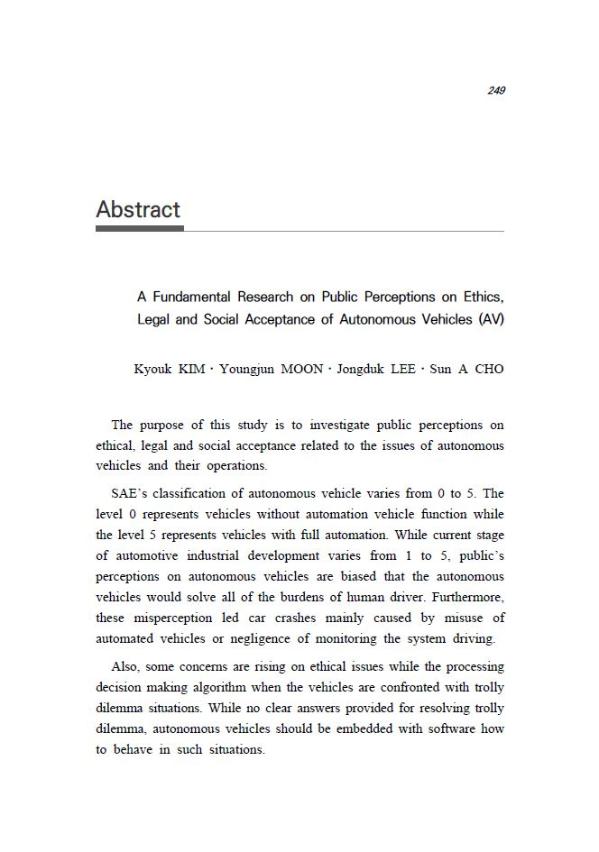General Research

RESEARCH
KOTI - Korea Transport institute
A Fundamental Research on Public Perceptions on Ethics, Legal, and Social Acceptance of Autonomous Vehicles (AV)
- Date
November 30 2016
- Page(s)
page(s)
#autonomous vehicles

The purpose of this study is to investigate public perceptions on ethical, legal and social acceptance related to the issues of autonomous vehicles and their operations.
SAE’s classification of autonomous vehicle varies from 0 to 5. The level 0 represents vehicles without automation vehicle function while the level 5 represents vehicles with full automation. While current stage of automotive industrial development varies from 1 to 5, public’s perceptions on autonomous vehicles are biased that the autonomous vehicles would solve all of the burdens of human driver. Furthermore, these misperception led car crashes mainly caused by misuse of automated vehicles or negligence of monitoring the system driving.
Also, some concerns are rising on ethical issues while the processing decision making algorithm when the vehicles are confronted with trolly dilemma situations. While no clear answers provided for resolving trolly dilemma, autonomous vehicles should be embedded with software how to behave in such situations.
To study public’s perception on overall autonomous vehicles themselves and preferences on transport services served by autonomous fleets such as buses and taxies, this study carried out the survey focused on general public, experts in automobile and transport related industries and vocational drivers.
The results showed that experts preferred using autonomous vehicle technologies and relevant transport services more than general public.
While vocational drivers showed less preferred using autonomous vehicle technologies than general public. Overall, respondents showed hypocritical perceptions on AVs. They showed higher expectations that the AV would reduce car accidents in general, while showed concerns on technological malfunction would exacerbate the fatality caused by vehicle crashes.
Furthermore, authors devised experiments to observe general public’s behaviors on ethical and philosophical issues regarding trolly dilemma.
The results showed that 75 to 80% of general publics made self-interested decisions on trolly dilemma scenarios that the respondents were assumed to be involved in the crash, while 17% of them made altruistic decisions. Also, when they confronted with the crash situation that they had to choose motor-bike riders with or without safety helmet, more respondents choose to crash into riders with safety helmet which raised another debating issues on adverse selection problem.
To improve preferences of general public on autonomous vehicles as well as managing conflicts that may arise from vocational drivers stem from their unfavorable preferences, this study suggested to devise detailed strategies for improving public awareness, managing conflicts, as well as providing consumer education.
To handel ethical issues arise in response to ethical decision making, this study suggested to form a deliberation groups called Social Acceptance Open Platform(SAOP) to discuss ethical issues relevant to autonomous vehicles with global players from industries, academia and public officials.
Furthermore, authors pinpointed legal issues that need to be revised or reformed in preparation for incorporating autonomous vehicles with various technical levels in Korean legal system.
SAE’s classification of autonomous vehicle varies from 0 to 5. The level 0 represents vehicles without automation vehicle function while the level 5 represents vehicles with full automation. While current stage of automotive industrial development varies from 1 to 5, public’s perceptions on autonomous vehicles are biased that the autonomous vehicles would solve all of the burdens of human driver. Furthermore, these misperception led car crashes mainly caused by misuse of automated vehicles or negligence of monitoring the system driving.
Also, some concerns are rising on ethical issues while the processing decision making algorithm when the vehicles are confronted with trolly dilemma situations. While no clear answers provided for resolving trolly dilemma, autonomous vehicles should be embedded with software how to behave in such situations.
To study public’s perception on overall autonomous vehicles themselves and preferences on transport services served by autonomous fleets such as buses and taxies, this study carried out the survey focused on general public, experts in automobile and transport related industries and vocational drivers.
The results showed that experts preferred using autonomous vehicle technologies and relevant transport services more than general public.
While vocational drivers showed less preferred using autonomous vehicle technologies than general public. Overall, respondents showed hypocritical perceptions on AVs. They showed higher expectations that the AV would reduce car accidents in general, while showed concerns on technological malfunction would exacerbate the fatality caused by vehicle crashes.
Furthermore, authors devised experiments to observe general public’s behaviors on ethical and philosophical issues regarding trolly dilemma.
The results showed that 75 to 80% of general publics made self-interested decisions on trolly dilemma scenarios that the respondents were assumed to be involved in the crash, while 17% of them made altruistic decisions. Also, when they confronted with the crash situation that they had to choose motor-bike riders with or without safety helmet, more respondents choose to crash into riders with safety helmet which raised another debating issues on adverse selection problem.
To improve preferences of general public on autonomous vehicles as well as managing conflicts that may arise from vocational drivers stem from their unfavorable preferences, this study suggested to devise detailed strategies for improving public awareness, managing conflicts, as well as providing consumer education.
To handel ethical issues arise in response to ethical decision making, this study suggested to form a deliberation groups called Social Acceptance Open Platform(SAOP) to discuss ethical issues relevant to autonomous vehicles with global players from industries, academia and public officials.
Furthermore, authors pinpointed legal issues that need to be revised or reformed in preparation for incorporating autonomous vehicles with various technical levels in Korean legal system.